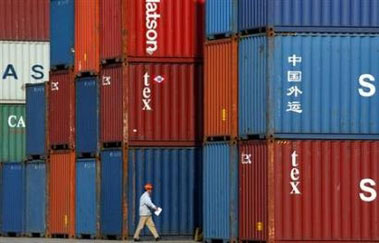China raised the prospect on Tuesday of allowing market forces to play a
greater role in setting the value of the yuan, saying most companies had adapted
well to the country's floating exchange rate regime.
The comments by central bank chief Zhou Xiaochuan came against the background
of intense U.S. pressure on Beijing to take firm action to cut its big trade
surplus with the United States. The yuan is the focus of U.S. pressure.

A worker walks past containers at the Longwu
Port in Shanghai, February 13, 2006. [Reuters] |
"Half a year after the foreign exchange reform, we can see that most Chinese
companies have weathered this reform thanks to hard efforts, though a small
number of industries has been greatly affected," the Economic Daily quoted Zhou
as saying.
"Based on this, we think we can let market supply and demand gradually play a
bigger role in the currency float," he said.
The newspaper said Zhou was speaking at a conference organized by a cabinet
think tank on March 20.
Zhou also said China's trade surplus, which tripled last year to US$102
billion, was set to fall, though not immediately.
"We reckon China may need two to three years to achieve a basic balance in
international trade," Zhou, the governor of the People's Bank of China, said.
As the surplus came down, China's accumulation of foreign exchange reserves
would slow, he said.
China overtook Japan in February to become the country with the world's
biggest stockpile of reserves, the China Business News reported on Tuesday.
It said China's reserves increased $8.5 billion in February to $853.7 billion
following a $26.3 billion jump in January.
China ran a bilateral trade surplus with the United States last year of
US$202 billion, according to the official U.S. tally. But China put the figure
at US$114.2 billion. Several law-makers in Washington are preparing
legislation designed to bring two-way trade into better balance.
The initiatives include a bill by Senators Charles Schumer and Lindsey Graham
that threatens to impose a 27.5 percent tariff on China's exports to the United
States if Beijing does not revalue the yuan closer to what they deem to be its
market value.
But Zhou said the level of the yuan was not key to achieving better-balanced
trade. He also said accusations that China was manipulating its currency would
not win widespread international support.
Although China was coping well with life under floating rates, Zhou said,
various Chinese companies and financial institutions still needed time to adapt.